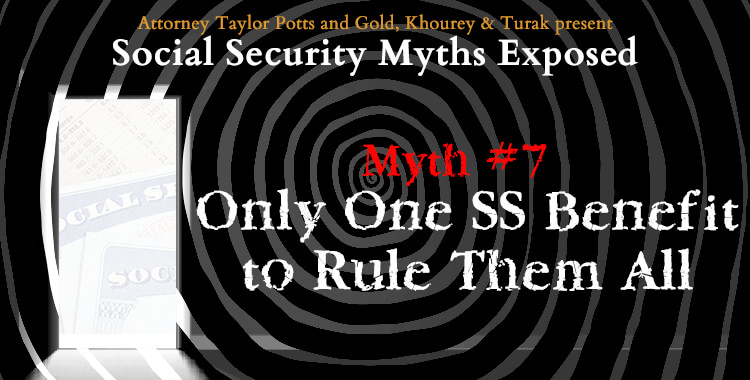
Every Tuesday, SS Disability Attorney Taylor Potts will expose some of the more frequent myths surrounding Social Security Benefits. Be sure to “like” our Facebook page and stop back each week as Attorney Potts takes you through The Twilight Zone – Social Security Style. If you have questions about Social Security Disability or VA Disability benefits, contact Attorney Taylor Potts at (304) 845-9750.
You are about to enter a land beyond what many of us know. A land that could almost be considered a different dimension. A dimension of medical records, vocational classifications, administrative law judges, and functional limitations. Strap yourself in and get ready as we enter the twilight zone of SS Disability benefits.
WARNING! PROCEED WITH CAUTION
SS Disability can be a strange and confusing land, but allow me to be your guide as we (hopefully) shed some of this mystery and bring it back into the realm of reality. In this series we will take some of the most common (12 to be exact) misunderstandings, or myths, about SS Disability Insurance and Supplemental Security Income and help explain why these myths are not necessarily true and why the myths became so pervasive.
THERE ARE MANY TYPES OF SOCIAL SECURITY DISABILITY BENEFITS
We are over halfway through our series of myths regarding Social Security Disability benefits. Today, we will be looking at something I hear all the time when I discuss benefits with clients and potential clients. When I ask them what type of Social Security Disability benefit they applied for, the response is generally, “just disability,” or “is there more than one type?”
This belief or confusion is understandable, but simply not true. There are many different types of benefits that fall under the Social Security’s disability program. While the programs have changed over the years, there are some lesser-used programs I will not cover.

Currently, there are six major types of SS Disability benefits:
- Disability Insurance Benefits
- Supplemental Security Income Benefits
- Survivor’s Benefits
- Widow/Widower’s Benefits
- Children’s Supplemental Security Income
- Retirement Benefits.
Each of these are covered by what is considered the disability portion of Social Security’s functions, and several are even applied for under the same applications. While all of them share certain similarities, they also have important differences when proving disability.
HOW THEY ARE ALL CONNECTED?
While there are many similarities between these benefits, the most important is this: in order to qualify for any of these SS disability benefits (absent retirement) you must meet the medical requirements to be considered disabled. The medical requirements are the same regardless of whether you are seeking Disability Insurance, Supplemental Security Income, Survivor’s Benefits, or any other benefit type. Children’s Supplemental Security Income uses slightly different rules for medical listings or listing equivalents but, despite this, the medical requirements are still very similar. You must be medically disabled to qualify for any of these disability benefits, then you must also meet the non-medical requirements, which are different between each type of benefit.
On top of the medical requirements, one overarching requirement for obtaining disability benefits of any type is the amount of limitation on income. All of the noted benefits (again, absent retirement) require you to be earning less than significant gainful activity amounts (SGA). Since SGA is not the subject of this blog, it is not discussed here. However, if you are interested to learn more about SGA, click here to read our prior blog.
DISABILITY INSURANCE BENEFITS

The non-medical requirements for Disability Insurance Benefits include that you must meet the necessary work credits from work income to be covered. While different numbers of work credits are needed for claimants of different ages, the most common requirement is that you must have at least five years of work credits over the last ten years. Thus, Social Security will look to your work credits to determine the date you were last insured. You must then be found medically disabled on or before that date to be eligible for Disability Insurance Benefits.
SUPPLEMENTAL SECURITY INCOME
Supplemental Security Income (SSI) is a needs based program. Thus, it sets significant limits on your assets and income before you can qualify for monthly payments. As a single individual, your assets are limited to $2,000. Married couples are entitled to $3,000 in assets before they are no longer eligible for SSI payments. Not everything is considered an asset by Social Security, so it is important to understand the distinction or exclusion before applying. Similarly with income, single individuals can have income but once it reaches the maximum amount SSI can pay ($781.00 per month for 2020), they are no longer eligible to receive monthly payments. For couples, the combined income amount for 2020 is $1,175.00 per month.
SURVIVORS/WIDOWS/WIDOWERS BENEFITS
These are benefits that would allow surviving children, surviving spouses, or divorced spouses to obtain disability benefits under their parents/spouses record. To be eligible for benefits, the person must prove they are the son/daughter, husband/wife, or former husband/wife in a marriage that lasted longer than 10 years.

For children, your parents must be eligible for Disability Insurance Benefits, be deceased or receiving disability payments themselves, and you must be determined disabled prior to turning 22 years old to qualify to claim disability payments under their record.
For a spouse, the surviving spouse is entitled to claim on their deceased spouse’s Disability Insurance Benefits upon turning 60 years of age regardless of anything else. However, if a disability can be proven, the surviving spouse can begin collecting 10 years earlier, or once they reach 50 years of age. A similar outcome results from those claiming benefits on a divorced spouse’s record. However, the way the Social Security Administration treats divorced spouse’s rights to collect on their prior spouse’s work record could be different than how a judge may order distribution of assets in a divorce proceeding (including retirement, disability, or other benefit entitlements).
RETIREMENT BENEFITS
Here, Retirement Benefits stand apart. You are not required to prove disability to obtain Retirement Benefits. You must simply meet the age requirement. You may begin to receive Retirement Benefits as early as a 62, with most people reaching full retirement age somewhere between the ages of 65 ½ and 67 depending on their date of birth. The downside is that when you take early Retirement Benefits, you permanently receive a reduction in the monthly amount you will receive for the remainder of your life. The percentage of your monthly payment is reduced by a sliding scale depending on the age you begin to receive early retirement.

However, early Retirement Benefits and Social Security Disability Benefits can go hand in hand. If you have been forced to take early Retirement Benefits because you can no longer work due to a medical problem, you may also be eligible for Social Security Disability payments. Under certain conditions, the negative impact on your retirement monthly payment amounts could be reversed.
SO IT’S COMPLICATED. WE CAN HELP!
As you can see, there is certainly more than one disability benefit. You may even be entitled to collect payments from more than one source at the same time. Which benefit type is best for you, and how the multiple benefits you may be entitled to will interact, is a complex and often confusing situation. While Social Security may do its best to help guide you, it is NOT their job to get you the most out of your disability or any other benefit. In addition, Social Security will NOT tell you what benefits you may be entitled to. Their job is to assist you to apply for the benefits that you are enquiring about.

At Gold, Khourey and Turak, we have the experience and knowledge to ensure that you are applying for any and all Social Security Benefits you are entitled to receive. GKT knows the Social Security system and we understand how to present your information to Social Security in order to obtain the best possible outcome for you.
If you are applying for Social Security Disability Benefits or have been denied for benefits, do not wait or go it alone. Call Gold, Khourey and Turak today at (304) 845-9750. We can assist you in obtaining the benefits you deserve. Our consultations are free, and you owe us nothing until we win money for you. Home, evening, and weekend appointments are available.


